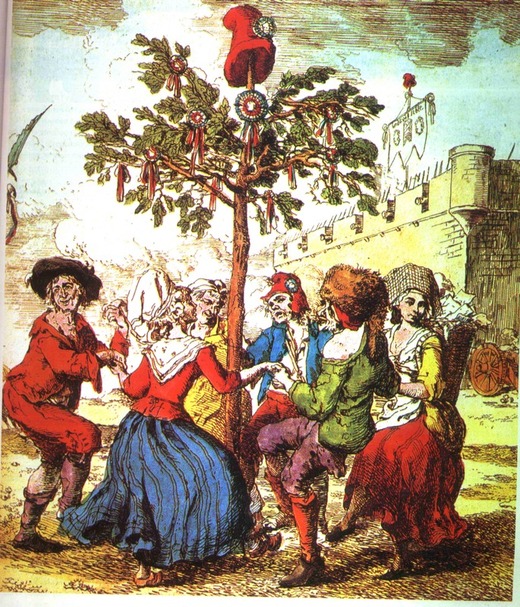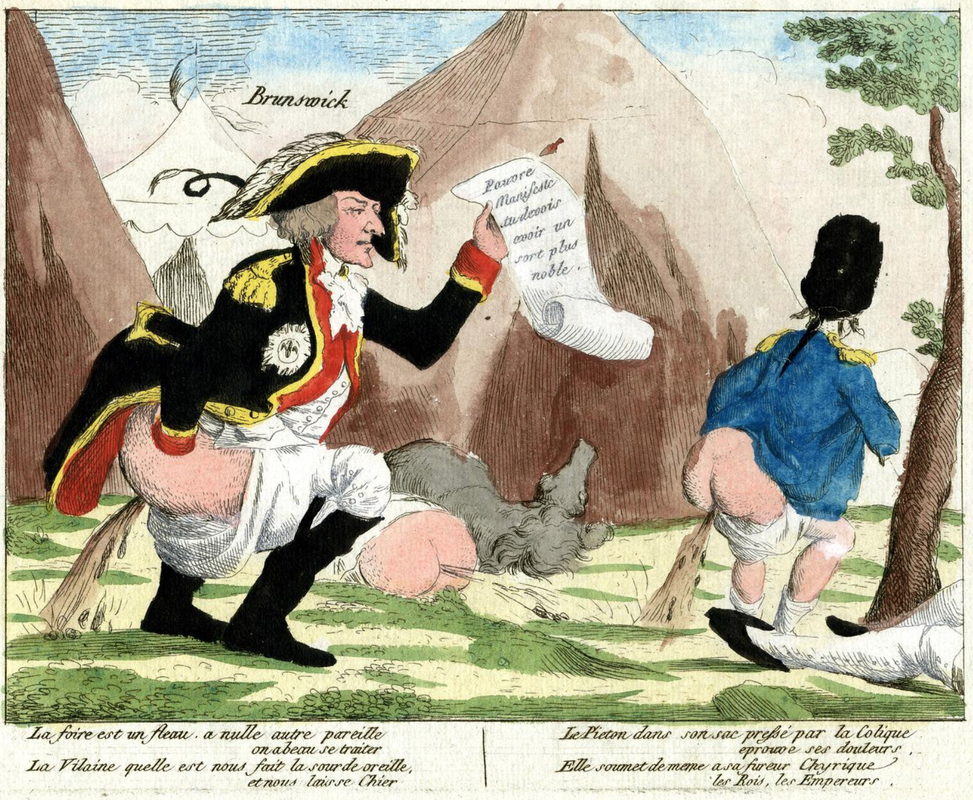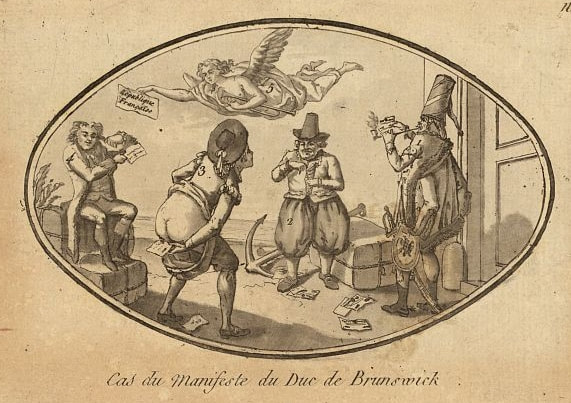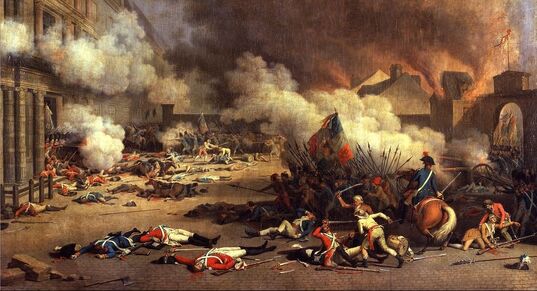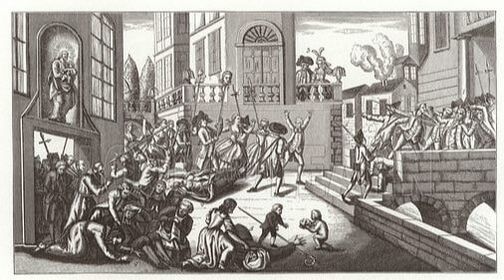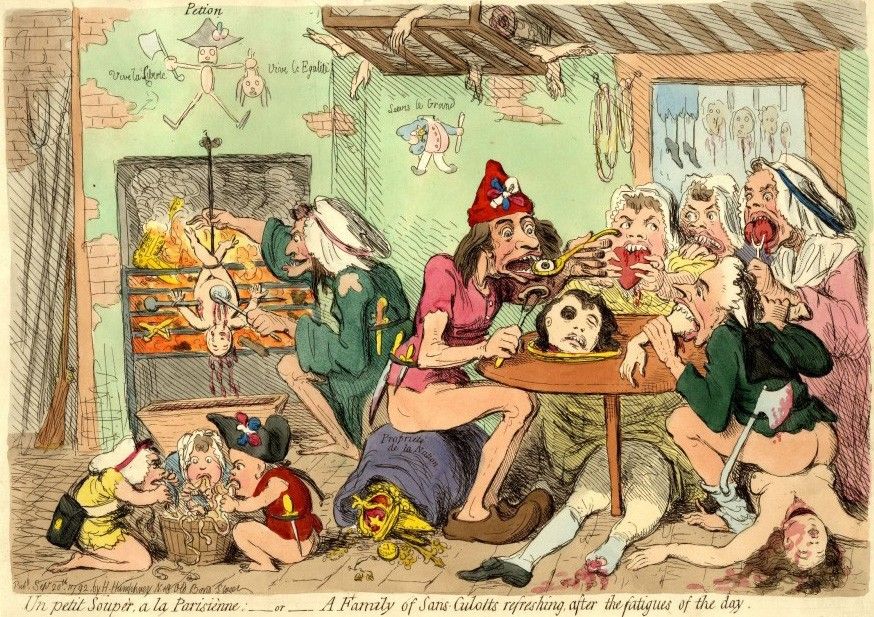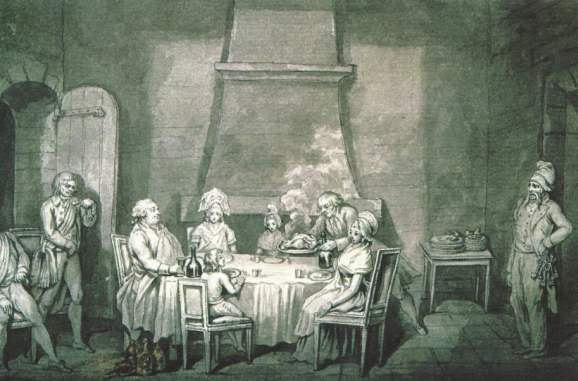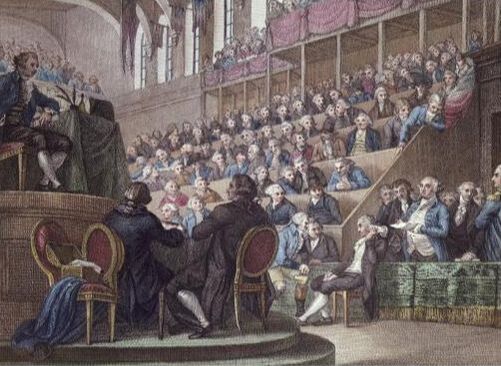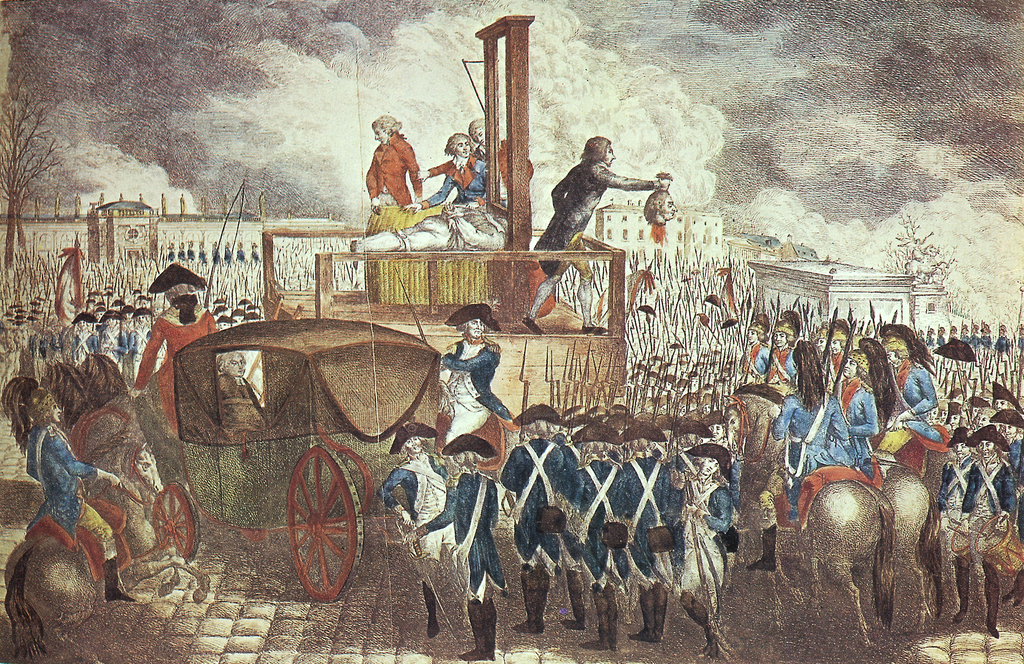Lesson 7 - Why did the French execute their king?
|
The revolutionary leaders in the National Assembly were now divided about what should happen to the King. Many moderate deputies, known as Girondins, still wanted Louis to have a place in France's new constitution. More radical deputies, known as Jacobins, felt that the King could not be trusted and should be deposed. Many ordinary citizens supported the Jacobins. A series of events in France gradually led to the Jacobins becoming more influential.
14 September 1791: The new constitution - The King accepted the new constitution which had been written by the National Assembly. Louis was still allowed to veto new laws, but most of his powers were removed. At the ceremony for the new constitution, Louis was forced to sit on a simple chair rather than a throne. |
|
|
20 April 1792: War declared on Austria - To the east of France was the huge Austrian Empire. It was ruled by the Emperor Leopold, Marie Antoinette's brother. Leopold was protecting nobles who had fled from France and who were plotting against the Revolution. On 20 April 1792, the National Assembly declared war on Austria. But the war started badly for France.
20 June 1792: The sans culottes attack the Tuileries - The sans culottes were working people in Paris who hated the monarchy. They thought that ordinary people like themselves should have power. The sans culottes suspected that Louis actually wanted France to lose the war with Austria. On 20 June 1792, a crowd of 8,000 armed sans culottes (right) broke into the Tuileries. They forced the King to wear the red cap of liberty and to toast the people of Paris. The mob had spared the King's life, but this was another humiliation for Louis 25 July 1792: The Brunswick Manifesto - By July 1792 Prussia had joined Austria in the war against France. The leader of the enemy forces was the Duke of Brunswick. On 25 July he signed a document known as the Brunswick Manifesto. This stated that if the Tuileries was attacked again the invading armies would totally destroy Paris, The sans culottes were outraged, as you can see from some of the popular cartoons of the time below. On the streets of Paris the King and Queen became even more unpopular.
|
|
10 August 1792: Massacre at the Tuileries - At the beginning of a hot August, rumours spread that the King was secretly supporting the invading foreign armies. Early in the morning of 10 August, around 10,000 angry revolutionaries from all over Paris marched towards the Tuileries. They broke into the palace and began to massacre the King's soldiers, (the Swiss Guards) and servants. The royal family fled and took refuge at the National Assembly. Out of the nine hundred Swiss Guards defending the king, only three hundred survived, and of these an estimated two hundred either died of their wounds in prison or during the September Massacres that followed.
|
|
2-6 September 1792: The September Massacres - At the beginning of September, there was panic in Paris. People feared that the Prussians were about to capture the city. Rumours spread that the priests and nobles in the overcrowded prisons were plotting to escape, kill the citizens of Paris and hand over the city to the Prussians. On 2 September, the sans culottes began the brutal murder of the prisoners. The massacre lasted for five days. Nearly 1,500 prisoners were killed. The Revolution had become much more violent. In England public opinion was shocked by the events, as illustrated by this famous cartoon below by James Gillray, the 'father of the political cartoon' who we have already come across on two separate occasions previously. (Bumboats and Bastille).
|
|
21 September 1792; The royal family imprisoned - To most revolutionaries the King now seemed like a useless burden to France. Six weeks after the massacre at the Tuileries a new Assembly (now called the Convention) voted to abolish the monarchy and set up a republic. The people would elect their own rulers and the King would no longer play any part in the government of France. The Convention decided that Louis and his family should be locked away. The King and his family spent the autumn of 1792 imprisoned in two floors of a damp tower in the centre of Paris. It was called the Temple. Life in the Temple was not pleasant. The prison guards showed the royal family a lack of respect. They called the King simply 'Louis'. Each day, when the royal family took their afternoon walk in the Temple grounds, hundreds of people shouted insults at them.
|
Activity 1
In our previous lesson we saw how the king gradually lost power after the storming of the Bastille. After his attempted escape which was stopped in Varennes a new constitution was created in September 1791 which significantly reduced his power. However, at this point France was still a constitutional monarchy and not a republic. Choose three key moments in the 12 months from September 1791 to September 1792 which led to France becoming a republic. For each of these three moments explain why they were important.
In our previous lesson we saw how the king gradually lost power after the storming of the Bastille. After his attempted escape which was stopped in Varennes a new constitution was created in September 1791 which significantly reduced his power. However, at this point France was still a constitutional monarchy and not a republic. Choose three key moments in the 12 months from September 1791 to September 1792 which led to France becoming a republic. For each of these three moments explain why they were important.
The trial and execution of the king.
The King had been deposed and imprisoned, but some of the revolutionaries thought that the Convention had not gone far enough. As long as Louis was alive there might be a counter-revolution. Some of the Jacobin deputies in the Convention demanded the trial and execution of the King. Their demands gained more support at the end of November when an iron box containing the King's documents was discovered at the Tuileries. It was clear from some of the King's letters in this box that he had been plotting to overthrow the Revolution. On the morning of 11 December, soldiers arrived at the Temple to escort Louis for trial at the Convention. The King, dressed in a green silk coat, stood before the Convention until the President gave him permission to sit down.
The King had been deposed and imprisoned, but some of the revolutionaries thought that the Convention had not gone far enough. As long as Louis was alive there might be a counter-revolution. Some of the Jacobin deputies in the Convention demanded the trial and execution of the King. Their demands gained more support at the end of November when an iron box containing the King's documents was discovered at the Tuileries. It was clear from some of the King's letters in this box that he had been plotting to overthrow the Revolution. On the morning of 11 December, soldiers arrived at the Temple to escort Louis for trial at the Convention. The King, dressed in a green silk coat, stood before the Convention until the President gave him permission to sit down.
Over thirty charges against Louis were then read out. These included:
Using force against the National Assembly
Secretly plotting to overthrow the Revolution
Accepting the Constitution which he despised
Attempting to escape from France
Bankrupting the country
On 4 January the Convention reached its verdict. 693 deputies voted for Louis' guilt. Some deputies were absent, but not one deputy voted for Louis' innocence. The question of the penalty that Louis should pay caused more disagreement.
Using force against the National Assembly
Secretly plotting to overthrow the Revolution
Accepting the Constitution which he despised
Attempting to escape from France
Bankrupting the country
On 4 January the Convention reached its verdict. 693 deputies voted for Louis' guilt. Some deputies were absent, but not one deputy voted for Louis' innocence. The question of the penalty that Louis should pay caused more disagreement.
Some deputies wanted the King to be imprisoned for life. Others felt that he should be banished to America. But in the end just over half the deputies thought the King should pay with his life. On 17 January Louis XVI was sentenced to death.
|
The King was executed on 21 January 1793. The guards in the Temple woke Louis at around 6am. The King dressed in simple clothes. He took off his wedding ring and asked his valet to give it to Marie Antoinette. Louis was placed in a closed carriage and taken through the damp, foggy streets of Paris to the Place de la Revolution. The people lining the streets watched in silence. The steps to the scaffold were so steep that Louis had to lean on his priest for support. The executioner cut the King's hair roughly. Louis then attempted to address the 20,000 people in the square:
"I die innocent of all the crimes of which I have been charged. I pardon those who have brought about my death and I pray that the blood you are about to shed may never be required of France." |
|
But the King's words were drowned out by a roll of drums. The executioner strapped Louis to a plank and pulled the cord on the guillotine. The blade hissed down and sliced through the King's neck. The executioner pulled Louis' head from the basket and showed it, dripping with blood, to the people.
|
Activity 2
|
From the speech of Saint-Just, the youngest deputy.
“He oppressed a free nation; he declared himself its enemy; he abused its laws; he must die to ensure the peacefulness of the people, since to assure his own he intended that the people be crushed. Monarchy is an outrage. No man can reign innocently. Louis is an alien among us and not a citizen. He must die.” Full text of the speech. |
It is 27 December 1792 and you are an elected member of the French Convention. You have just heard Saint-Just make a powerful speech in support of the execution of the king. In pairs write one speech each. One of you should write in support of the execution and one of you against. Each speech should be no more than two minutes in length.
Additional useful websites
A school activity with sources for and against the execution of the king
Additional useful websites
A school activity with sources for and against the execution of the king

